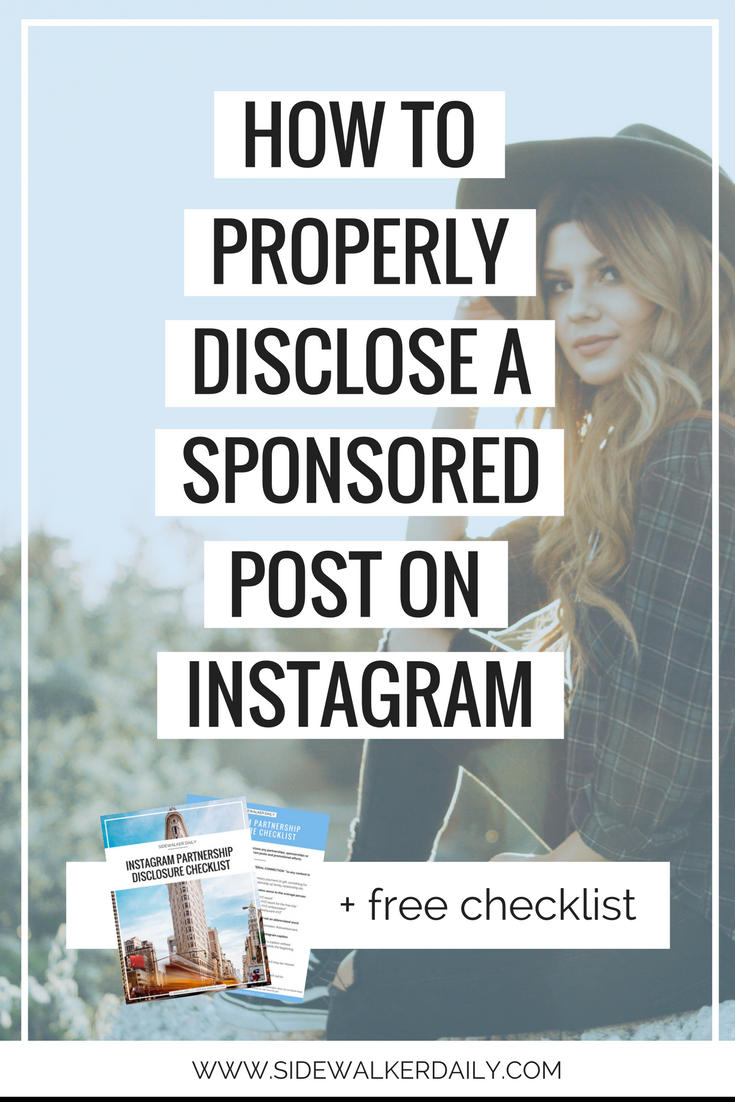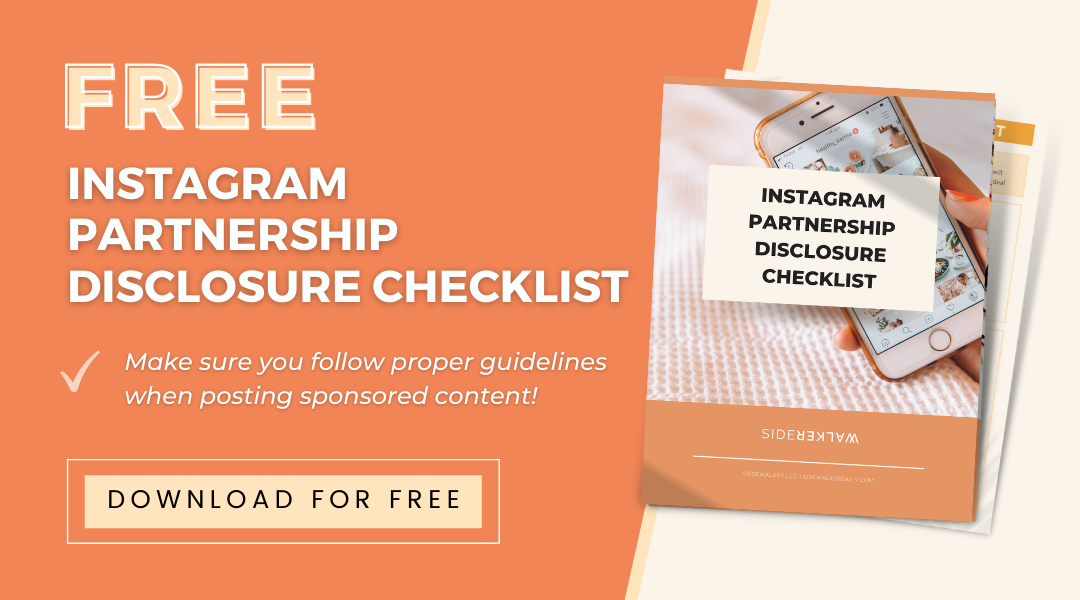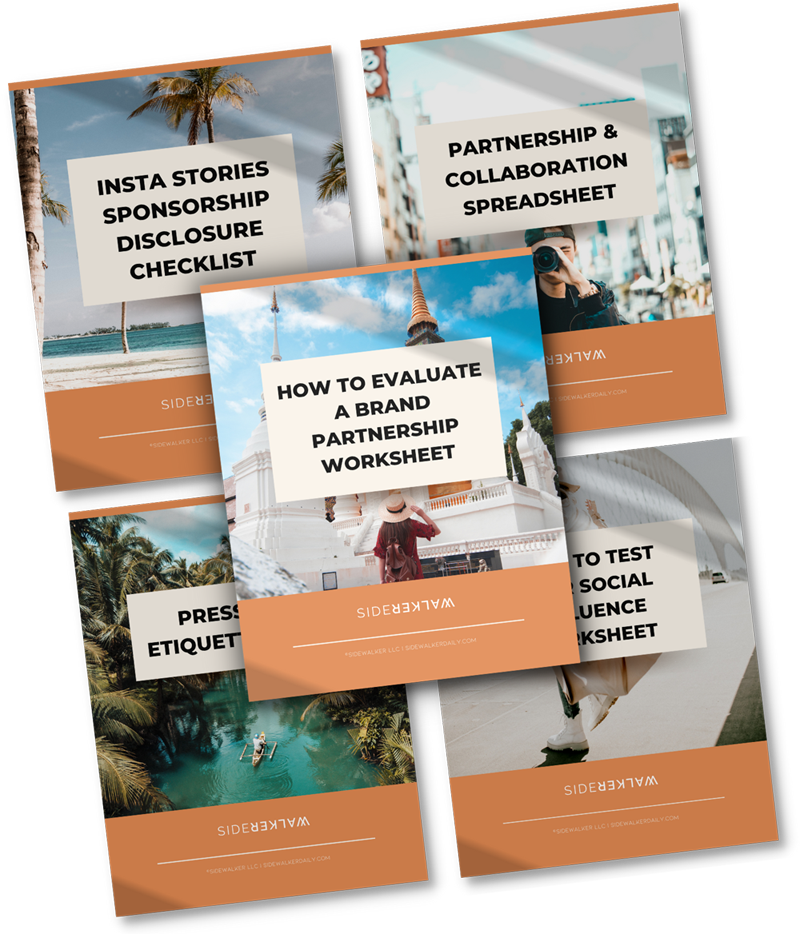HOW TO PROPERLY DISCLOSE A SPONSORED POST ON INSTAGRAM
Landing sponsorships is exciting both professionally and personally – it means brands recognize your value AND that you’re getting compensated for all your hard work. With the pressure of Instagram to be overly “authentic” and provide your audience with effortless content, having to disclose your sponsored posts can be a total buzz kill. But all businesses (even Influencers) have to comply with the law on properly disclosing sponsored posts, partnerships and collaborations.
At Sidewalker Daily we work with Influencers and Creators to pitch to brands and land paid deals and we also consult with brands as they build out their Influencer strategies. We’ve seen through many Influencer partnerships on both sides of the equation. In this post we’re going to go into what you need to know about disclosing a sponsored post so that you can maintain the integrity of your content and collaborations.
We get it. Sponsored Posts Are A Catch 22.
Do you remember when you got your first sponsorship? It was a total “is this real life?!” moment. And in reality it’s actually a big deal to start getting paid brand deals for doing what you love so congrats to you!
But then the doom sets in…how do you deliver on your end of the bargain without ruining your perfect Instagram feed? We all know that nothing about Instagram is effortless and when creating a sponsored post there is an underlying pressure to:
- Create content that doesn’t look like it’s actually sponsored;
- Shoot something that fits within your current feed organically;
- Make sure the post is something your followers and online community will engage with (and like);
- Showcase the product or destination in the best way possible using your resources; and
- Notify your community that the post is sponsored in a way that won’t deter them from engaging or liking.
… and that friends, can be super overwhelming.
But, as much as it’s annoying to have to digitally yell “hey, I’m getting paid to post this,” it’s illegal not to.
You may be thinking, “ya ya but no one will notice if I don’t, right? I have less than a million followers, so I wouldn’t be on anyone’s radar anyway.”
We hate to break it to you but the law doesn’t discriminate.
If you’re not complying with legal rules and regulations for sponsored posts, then you’re opening yourself up to liability. It’s pretty simple. If you want to get paid for sponsored posts, you
And even more of a reason to disclose your partnerships and sponsorships is to create trust with your followers.
You don’t want people to think every post you do is an advertisement. If people can’t differentiate between a sponsored post and a post about something you’re dying to share with them, then your followers will always second guess your recommendations.
It’s nice to be able to gush about your new favorite suitcase brand or amazing hotel in Milan, without having people thinking “oh, they got paid to say that.” Sponsorship disclosures are important because they help others decide on how much weight to give a particular recommendation or endorsement.
So what does this mean for you?
It means you need to disclose all sponsored posts and be transparent because you not only owe it to your followers but you also owe it to yourself. You’ve worked hard to build something you love and need to do everything in your power to protect the future of your business.
Disclosure Requirements for A Sponsored Post Are Pretty Simple.
The Federal Trade Commission (the US boss and authority on this topic) regulates advertisements and endorsements in the US with one of their main goals being to protect consumers. They keep advertisers in check and make sure they are not misleading the public and cashing in on any funny business. The social media landscape has evolved over the past few years and the Federal Trade Commission (FTC) is starting to catch up. The FTC has A LOT to say about sponsored posts and endorsements on social media so we’re breaking down what you need to know and how it all applies to you.
If there is a “material connection” between you and anything in your Instagram post then you have to disclose it.
It doesn’t matter if money exchanged hands – what the FTC cares about is if your followers knew a brand or destination gave you something for free (or at a hefty discount), would knowing that information affect the way they view your post and recommendation? There are a few scenarios that can trigger a “material connection” which means you have to put proper disclosures on your Instagram post:
- Payment (Monetary Compensation)
- Example: You were paid by a fashion brand to post a picture of you wearing their new dress on your Instagram account.
- Gift, Free Product and/or Substantial Discount
- Example: You were given a free hotel stay for your trip to Italy with the agreement (or even expectation) you were going to post a picture of the hotel on your Instagram account.
- Business Relationship
- Example: You have an ownership interest in a startup bathing suit brand and want to promote the bathing suit company on your Instagram account.
- Family Relationship
- Example: Your aunt opened a new trendy restaurant in LA and you want to post a picture of it on your Instagram account and encourage your followers to go.
Disclosing a “material connection” is important to people viewing your post so they know if there’s another reason behind the scenes (besides you liking the product, brand or destination) that might have caused you to post about it. It makes sense – you would want to know too.
How To Disclose A
Sponsored Post
It doesn’t take a rocket scientist to disclose properly, just a couple extra steps.
The FTC sets out clear guidelines on how to properly disclose a sponsored post on Instagram. Follow the Instagram sponsored post rules laid out by the FTC and you should be fine. You just have to make sure every disclosure:
1. Stands Out.
Sponsored posts needs to be disclosed “clearly and conspicuously.” Basically, don’t be shady. Your followers can probably already tell when a post is sponsored anyway and will appreciate you shooting it to them straight.
2. Falls within the first 3 lines of the caption.
Since Instagram posts on mobile only display the first 3 lines of the caption (unless the person clicks more which we know not everyone does), disclosures need to be made in the beginning so people will definitely get the heads up when getting their scroll on.
3. Is not be buried within a sea of hashtags.
Trying to hide disclosure language in a block of hashtags doesn’t work for the FTC. Also, trying to get creative with hashtags is a no go. We’re all about abbreviating words but this is definitely not the time or place. For example, #sponsored gets the green light but #spon is a definite red flag.
4. Makes sense to the average person (not the average blogger).
While you might be fluent in emoji and online slang you have to create disclosures that would make sense to your grandma, not your bff.
It’s good practice when creating your disclosures to put yourself in the viewer’s shoes to see if it would make sense to them. That’s what the FTC does when deciding if a disclosure is adequate.
Instagram Sponsored Post Rules
One more thing – just because Instagram has a built in feature to alert your followers of a paid sponsorship doesn’t mean using that function makes your disclosure legal. Remember, the FTC is boss so follow their rules and you’ll be good to go.
Related: How to Properly Disclose An Instagram Sponsorship On Stories
The bottom line is no matter if you’re a celebrity, travel blogger or style influencer, disclosure rules apply to YOU. Like we said, the law doesn’t discriminate so when in doubt, disclose. As cliche as it sounds, it’s always better to be safe than sorry and to remember these sponsored post tips:
1. Not only is disclosig a sponsored post a law, it’s also important for maintaining trust with your followers.
2. The FTC outlines the requirements for a sponsored post; it is your responsibility to keep up to date with these rules and not just rely on what a brand tells you.
3. A sponsorship disclosure needs to be clear and stand out.
4. It should be in the first 3 lines of the caption.
5. It cannot be buried within the hashtags.
6. Ensure that it makes sense to anyone who reads it.
You’ve worked hard to get paid brand deals and monetize your influence. Don’t jeopardize all of your hard work by not disclosing your partnership the rifht way. The legal steps you take for your business are just as important as the creative side. And remember, you have to know how to disclose a sponsored post on Instagram Stories too, not just feed posts.
If you’re still finding it hard to secure paid partnerships or need help getting started, book a one-on-one coaching call with one of our experts and we’ll develop a strategy for pitching to brands tailored to you!
Did you find this article helpful? If so, leave a comment below – we’d love to hear from you!
























